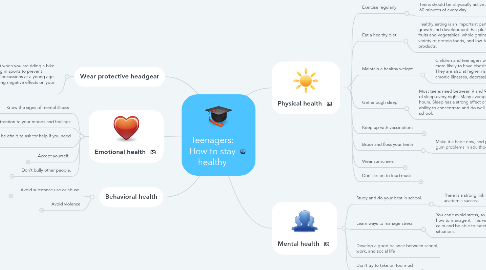
1. Wear protective headgear
1.1. Wear a helmet when you are riding a bike or participating in sports to prevent concussions. Concussions at a young age can have lifelong negative effects on your health.
2. Emotional health
2.1. Know the signs of mental illness
2.1.1. These include: anxiety depression excessive tiredness loss of self-esteem loss of interest in things you used to like loss of appetite weight gain or loss out-of-character personality changes
2.2. Pay attention to your moods and feelings
2.2.1. Don’t assume your negative thoughts or feelings are just part of being a teenager. If you’re worried about something, ask for help.
2.2.2. If you can’t talk to your parents, talk to a favorite teacher or counselor at school. Find an adult you can trust. If you’re feeling really sad or are thinking about harming yourself, get help right away.
2.3. Don’t be afraid to ask for help if you need it
2.4. Accept yourself.
2.4.1. If you feel like you have low self-esteem or a poor body image, talk to someone about it. Even just talking to a friend can help.
2.5. Don’t bully other people.
2.5.1. And if you are being bullied, tell a parent, teacher, or other adult. This includes being bullied online or on your phone.
3. Behavioral health
3.1. Avoid substance use or abuse
3.1.1. This includes alcohol, street drugs, other people’s prescription drugs, and any type of tobacco product. Drive safely. Motor vehicle crashes are the leading cause of death in U.S. teenagers. Always use your seat belt. Avoid riding in a car full of other teenagers. This can distract the driver and make an accident more likely. Never get in a car with a driver who has been drinking.
3.2. Avoid violence
3.2.1. Stay away from situations where violence or fighting may cause you to be physically injured.
4. Physical health
4.1. Exercise regularly
4.1.1. Teens should be physically active at least 60 minutes of every day.
4.2. Eat a healthy diet
4.2.1. Healthy eating is an important part of your growth and development. Eat plenty of fruits and vegetables, whole grains, a variety of protein foods, and low-fat dairy products.
4.3. Maintain a healthy weight.
4.3.1. Children and teenagers with obesity are more likely to have obesity as an adult. They are also at higher risk for other chronic illnesses, depression, and bullying.
4.4. Get enough sleep
4.4.1. Most teens need between 9 and 9 ½ hours of sleep every night. Many average only 7 hours. Sleep has a strong effect on your ability to concentrate and do well at school.
4.5. Keep up with vaccinations.
4.5.1. Get a flu shot every year. If you haven’t gotten the HPV vaccine, ask your parents and doctor about it. It can prevent you from getting HPV and some kinds of cancer, including cervical cancer.
4.6. Brush and floss your teeth
4.6.1. Make it a habit now, and prevent tooth and gum problems in adulthood.
4.7. Wear sunscreen.
4.7.1. Getting just one bad sunburn as a child or teenager increases your risk of getting skin cancer as an adult.
4.8. Don’t listen to loud music
4.8.1. This can damage your hearing for the rest of your life
5. Mental health
5.1. Study and do your best in school.
5.1.1. There is a strong link between health and academic success.
5.2. Learn ways to manage stress
5.2.1. You can’t avoid stress, so you need to learn how to manage it. This will help you stay calm and be able to function in stressful situations
5.3. Develop a good balance between school, work, and social life
5.4. Don’t try to take on too much
5.4.1. Limit your activities to the most important ones and give those 100%. Overextending yourself can lead to stress, frustration, or exhaustion

